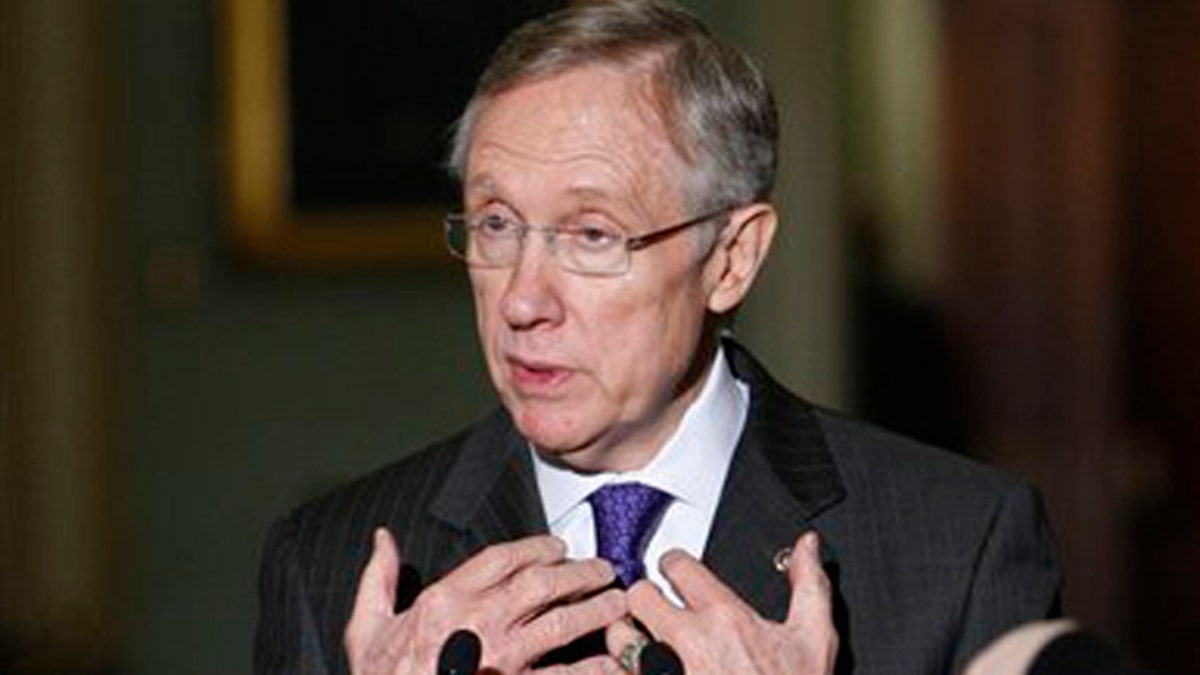
Senate Majority Leader Harry Reid of Nev. speaks to reporters on Capitol Hill Tuesday, Jan. 26, 2010. (AP)
Faced with criticism that the Democratic-sponsored jobs bill would not primarily create new jobs, Senate Majority Leader Harry Reid abruptly announced Thursday that he had drastically slimmed down the bill from $85 billion to just $15 billion, tossing out key priorities of both Republicans and Democrats.
"We are going to move a smaller package than talked about in the press," the Nevada Democrat said. "Republicans are going to have to make a choice. We have a bipartisan bill that will create jobs, according to the CBO, immediately."
But it is far from clear if that package really will be "bipartisan" because the smaller package jettisons some key provisions, namely a popular package of tax extenders that Republicans are keen to renew.
It was a surprise move by Reid since it had seemed as early as Thursday morning -- the same time that Reid made the decision, sources said -- that a larger bill, with critical bipartisan support from Sen. Chuck Grassley of Iowa, the top Republican on the Finance Committee, was on something of a glidepath to passage in the next few weeks.
Sen. Orrin Hatch, R-Utah, who co-sponsored a key part of the initial $85 billion bill to offer a $5,000 payroll tax break to employers who hire new employees, also spoke favorably of the bill.
On Wednesday, Sen. Jon Kyl, R-Ariz., said that he thought the bill would easily pass.
But now, that prospect is somewhat in doubt with Republicans far from happy.
"Sen. Reid's announcement sends a message that he wants to go partisan and blame Republicans when Sen. Grassley and others were trying to find common ground on solutions to help get the economy back on track and people back to work," said Grassley spokeswoman Jill Kozeny.
"Sen. Reid did this just as Republican senators were saying they liked things in the Baucus-Grassley draft, which would have prevented billions of dollars in tax increases and offset any spending," she added.
"The majority leader pulled the rug out from work to build broad-based support for tax relief and other efforts to help the private sector from the economic crisis," she said.
But Democrats shrugged off Republican concerns.
"We have four provisions that should under any circumstance enjoy broad bipartisan support," said a senior Senate Democratic leadership aide, adding, "It shouldn't be much of a gamble at all."
The $15 billion bill includes a $13 billion payroll tax break for employers who hire new workers; $35 million for small business depreciation; $2 billion for "Build America Bonds" for infrastructure; and a one-year extension of the highway bill, which a senior aide told Fox News would have "no revenue effect."
The extenders that were removed include billions of dollars for research and development and a GOP priority to trim down the estate tax -- which is set at zero now but will jump to a whopping 55 percent in 2011 on estates worth $1 million or more.
"We'll deal with those other provisions soon and throughout the year," the aide said.
The estate tax fix is of primary importance to one conservative Democrat, Blanche Lincoln of Arkansas, who is in an enormously difficult fight for re-election this year in her farm-heavy state.
And Democrats also saw some of their own priorities axed from this first bill in their party's "jobs agenda." Reid removed an extension of unemployment insurance and COBRA benefits for the unemployed, as well as a one-year extension of the Patriot Act and flood insurance.




